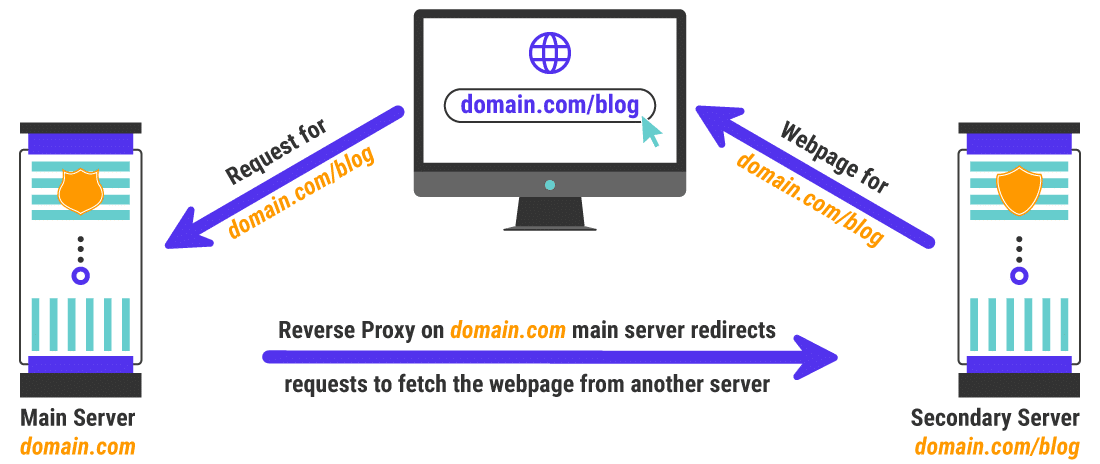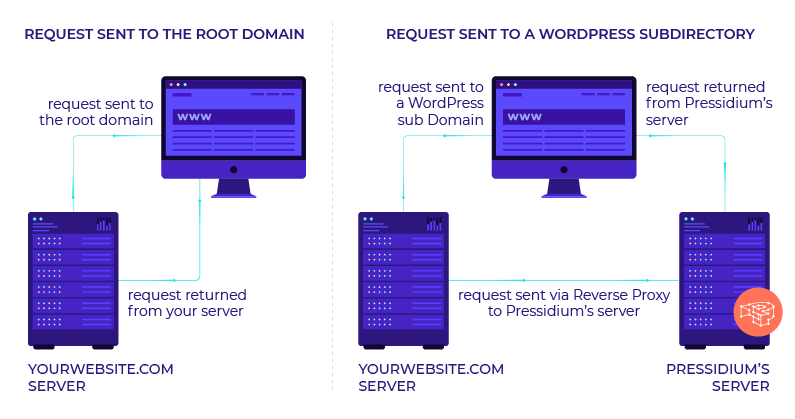Moz Q&A is closed.
After more than 13 years, and tens of thousands of questions, Moz Q&A closed on 12th December 2024. Whilst we’re not completely removing the content - many posts will still be possible to view - we have locked both new posts and new replies. More details here.
WordPress Sub-directory for SEO
-
Hi There,
I'm working on a WordPress site that includes a premium content blog with approx 900 posts.
As part of the project, those 900 posts and other membership functionality will be moved from the main site to another site built specifically for content/membership.
Ideally, we want the existing posts to remain on the root domain to avoid a loss in link juice/domain authority.
We initially began setting up a WordPress Multisite using the sub-directory option. This allows for the main site to be at www.website.com and the secondary site to be at www.website.com/secondary.
Unfortunately, the themes and plugins we need for the platform do not play nicely with WordPress Multisite, so we started seeking a new solution, and, discovered that a second instance of WordPress can be installed in a subdirectory on the server. This would give us the same subdirectory structure while bypassing WordPress Multisite and instead, having two separate single-site installs.
Do you foresee any issues with this WordPress subdirectory install? Does Google care/know these are two separate WordPress installs and do we risk losing any link juice/domain authority?
-
@himalayaninstitute said in WordPress Sub-directory for SEO:
WordPress can be installed in a subdirectory
I have done this a lot and I mean a lot what you want to do is set up a reverse proxy on your subdomain and this will allow you to not only bypass having to use multisite for subfolder but if you want to power it separately you can you do not have to it all. You should probably use your same server and power through Fastly our CloudFlare


once you set this up it is super easy to keep it running in your entire site will be much faster as a result as well
my response to someone else that needed a subfolder
https://moz.com/community/q/topic/69528/using-a-reverse-proxy-and-301-redirect-to-appear-sub-domain-as-sub-directory-what-are-the-seo-risksplease also look at it explained by these hosting companies is unbelievable easy to implement compared to how it looks and you can do so with Fastly or cloudflare in a matter of minutes
-
https://servebolt.com/help/article/cloudflare-workers-reverse-proxy/
-
https://support.pagely.com/hc/en-us/articles/213148558-Reverse-Proxy-Setup
-
https://wpengine.com/support/using-a-reverse-proxy-with-wp-engine/
-
https://thoughtbot.com/blog/host-your-blog-under-blog-on-your-www-domain
-
https://crate.io/blog/fastly_traffic_spike
*https://support.fastly.com/hc/en-us/community/posts/4407427792397-Set-a-request-condition-to-redirect-URL -
https://coda.io/@matt-varughese/guide-how-to-reverse-proxy-with-cloudflare-workers
-
https://www.cloudflare.com/learning/cdn/glossary/reverse-proxy/
-
https://gist.github.com/LimeCuda/18b88f7ad9cdf1dccb01b4a6bbe398a6
I hope this was of help
tom
-
-
@nmiletic The content section of the site requires a unique UI Design and other robust functionality, so having a separate theme/plugins in its own directory is going to be the way we go here. Thanks for your assistance!
-
@himalayaninstitute Have you thought about adding a page and making all of this new content a subpage? Or changing your permalink structure to include a category in the URL? You can then add all of these posts under that category and have the URL show up as www.example.com/category/page-or-post-name
-
The website at the subdirectory will be an online learning platform with a blog, online courses, memberships, gated content, etc. The content currently lives on the main site, so, it's great that we can move it into the subdirectory without taking a hit from Google.
Since these are fundamentally two separate websites, we're not concerned about needing to manage them independently.
Thanks again for your input and advice, we greatly appreciate it!
-
@amitydigital said in WordPress Sub-directory for SEO:
Google will view it as one site so you shouldn't have any issues from that perspective. The Google bot is just looking at pages and won't know/care that the underlying CMS that is running some pages is a different install than other pages. The downside is you now have two websites to maintain, two themes, two sets of files, etc... That may result in a bit of a headache in the future.
As @amitydigital put it, the issue with your approach would be repetitive tasks. You will not loose any DA nor PA (being that you implement a correct 301 redirection). What is going to be on the subdirectory?
-
Google will view it as one site so you shouldn't have any issues from that perspective. The Google bot is just looking at pages and won't know/care that the underlying CMS that is running some pages is a different install than other pages. The downside is you now have two websites to maintain, two themes, two sets of files, etc... That may result in a bit of a headache in the future.
Got a burning SEO question?
Subscribe to Moz Pro to gain full access to Q&A, answer questions, and ask your own.
Browse Questions
Explore more categories
-
Moz Tools
Chat with the community about the Moz tools.
-
SEO Tactics
Discuss the SEO process with fellow marketers
-
Community
Discuss industry events, jobs, and news!
-
Digital Marketing
Chat about tactics outside of SEO
-
Research & Trends
Dive into research and trends in the search industry.
-
Support
Connect on product support and feature requests.
Related Questions
-
Moz API Spam Score - Backlinks
Hi, everyone I am trying to get my website DA up. I have analyzed my competitors and thanks to Moz I have idea and insights of how my competitors get backlinks. But, some of them are old school techniques. Also my website has some PBNs no follow backlinks does it affect my website ranking? Their spam score is 10-40. But other competitors has them as well. Does anyone know indepth on this topic?
Link Building | | RejinKayastha1 -
Duplicate Content and Subdirectories
Hi there and thank you in advance for your help! I'm seeking guidance on how to structure a resources directory (white papers, webinars, etc.) while avoiding duplicate content penalties. If you go to /resources on our site, there is filter function. If you filter for webinars, the URL becomes /resources/?type=webinar We didn't want that dynamic URL to be the primary URL for webinars, so we created a new page with the URL /resources/webinar that lists all of our webinars and includes a featured webinar up top. However, the same webinar titles now appear on the /resources page and the /resources/webinar page. Will that cause duplicate content issues? P.S. Not sure if it matters, but we also changed the URLs for the individual resource pages to include the resource type. For example, one of our webinar URLs is /resources/webinar/forecasting-your-revenue Thank you!
Technical SEO | | SAIM_Marketing0 -
Onsite SEO vs Offsite SEO
Hey I know the importance of both onsite & offsite, primarily with regard to outreach/content/social. One thing I am trying to determine at the moment, is how much do I invest in offsite. My current focus is to improve our onpage content on product pages, which is taking some time as we have a small team. But I also know our backlinks need to improve. I'm just struggling on where to spend my time. Finish the onsite stuff by section first, or try to do a bit of both onsite/offsite at the same time?
Intermediate & Advanced SEO | | BeckyKey1 -
CDN for SEO (or not)?
Does CDN impact on SEO or not? There seems conflicting ideas as to whether they impact positively or negatively, I realise that if the page loads quicker this is a good thing for SEO and usability of course. Does Google see CDN as just cheating and a get-around for not doing the work from the ground up and using good hosting etc? Do you have any direct experience? All constructive input much appreciated!
Intermediate & Advanced SEO | | seoman101 -
Robots.txt: how to exclude sub-directories correctly?
Hello here, I am trying to figure out the correct way to tell SEs to crawls this: http://www.mysite.com/directory/ But not this: http://www.mysite.com/directory/sub-directory/ or this: http://www.mysite.com/directory/sub-directory2/sub-directory/... But with the fact I have thousands of sub-directories with almost infinite combinations, I can't put the following definitions in a manageable way: disallow: /directory/sub-directory/ disallow: /directory/sub-directory2/ disallow: /directory/sub-directory/sub-directory/ disallow: /directory/sub-directory2/subdirectory/ etc... I would end up having thousands of definitions to disallow all the possible sub-directory combinations. So, is the following way a correct, better and shorter way to define what I want above: allow: /directory/$ disallow: /directory/* Would the above work? Any thoughts are very welcome! Thank you in advance. Best, Fab.
Intermediate & Advanced SEO | | fablau1 -
Is CloudFlare bad for SEO?
I have been hit by DDoS attacks lately...not on a huge scale, but probably done by some "script kiddies" or competitors of mine. Still, I need to take some action in order to protect my server and my site against all of this spam traffic that is being sent to it. In the process of researching the tools available for defending a website from a DDoS attack, I came across the service offered by CloudFlare.com. According to the CloudFlare website, they protect your site against a DDoS attack by showing users/visitors they find suspicious an interstitial that asks them if they are a real user or a bot...this interstitial contains a Captcha that suspicious users are asked to enter in order to visit the site. I'm just wondering what kind of an effect such an interstitial could have on my Google rankings...I can imagine that such a thing could add to increased click-backs to the SERPs and, if Google detects this, to lower rankings. Has anyone had experience with the DDoS protection services offered by CloudFlare, who can say a word or two regarding any effects this may have on SEO? Thanks
Intermediate & Advanced SEO | | masterfish1 -
Duplicate page titles Wordpress SEO/Yoast
Hi I have a Wordpress site using the Wordpress SEO plugin by Yoast. Everything appears to be fine except that on 1 Feb SEOMoz crawl suddenly picked up a bunch of errors. The errors are duplicate page titles, and these exist only for the mysite.com/page/X pages. I can't find any setting in Yoast that looks wrong or tells me how to fix this. The pages are also dynamically canonicalizing to themselves - not sure if this makes any difference although I don't know how this is happening. Does anyone know how to fix this duplicate title error? Alex
Intermediate & Advanced SEO | | alextanner0 -
URL Shorteners. Are they SEO Friendly?
Do URL shortener services like bit.ly act as 301 redirects? I was thinking about utilizing one for longer query based URLs and didn't want to risk losing link juice. Thanks for the insight! Regards - Kyle
Intermediate & Advanced SEO | | kchandler0